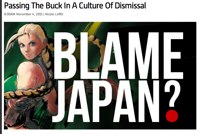Feminism in Gaming 1
Stacey Mason

The issue of misogyny in video game development and gaming culture is not exactly new, but within the academy we tend to treat it as a solved problem. So, when I read Nicole Leffel’s incisive look at the culture of dismissal that blankets the topic, I wanted to hug her. She puts into words a vague feeling I couldn’t express clearly at the last few “women and gaming” panels and events I’ve attended. Recognizing that women play games does not absolve the sexism of these games.

Feminism takes many forms which can often seem to contradict each other, and it can be difficult to reconcile what the “correct” approach to feminist problems should be.One school of feminism suggests that treating women with special reverence is a form of charity that subverts the idea of equality, that we should ignore gender differences altogether. Another school suggests that by subverting gender differences we are suggesting that femininity is something which should be suppressed, and we should therefore celebrate differences. One school wants to be freed of sexual objectification, another wants to embrace the power of female sexuality. How do we please everyone?
The last “women in gaming” panel I attend was at Pax East in Boston, where the women commented that they weren’t offended by women being sexy, they were offended by their lack of characterization or the ability to play a female character at all. This took me aback a little; surely these women weren’t saying it was okay for Lara croft’s gigantic breasts to be growing with each game while her outfits get smaller and smaller. But they were. They praised Dead or Alive: Xtreme Beach Volleyball for having a huge roster of female characters, excusing the fact that every one of those female characters wears skimpy bikinis and has animated breasts. At least they had a selection of female characters. It was as though the entire panel had set out to prove that they weren’t jealous of the female characters, a claim often thrown around to dismiss accusations of objectification, so therefore you could trust the rest of the feminist things they were going to say.
Objectification is a point on which feminists could easily find common ground. Games are fantasies of control, and there is a difference between being sexy and being objectified. When role playing, people like their avatar to be ideal: attractive, powerful, cool. If the character is too sexually focused, the character is no longer realistic enough for the player to attach consciousness to it. The problem is not that women in games are sexy, it’s that the sexiness is not styled in a way that women are meant to relate to.
In most games, excessive sexuality is either offensive or comedic. Either way, women are on the butt-end. It’s not hard to make a character attractive without making her grotesque. These are not instances of women actively using their sexuality for empowerment. Players are able to manipulate oversexualized characters into submissive positions or subvert their agency in other ways.
Laura Mulvey’s idea of the subjective male gaze posits a power difference, inherent in film, that derives from the subversion of the female who is styled by males as an object for male pleasure. In games, this is the equivalent to male developers creating a half-naked female character with grotesque proportions and physics-defying jiggle mechanics, but the difference between a sexist character and a non-sexist one is more complicated than how naked she is; the issue comes from why she is half-naked.
Characters like Kratos or Conan run around shirtless, but their bodies are not framed or able to be manipulated in a way that is designed to make them them the object of sexual fantasy. Their purpose, rather, is to enact male power fantasies. They are the character a male wants to identify with. Naked female characters, on the other hand are generally not there there to for women to identify with their sexual power, they are there to pleasure and serve the (heterosexual) male audience. Overly stylized sexuality prevents any audience—male or female—from being able to relate to the character.
Stay tuned for more on agency and identity in female characters.
